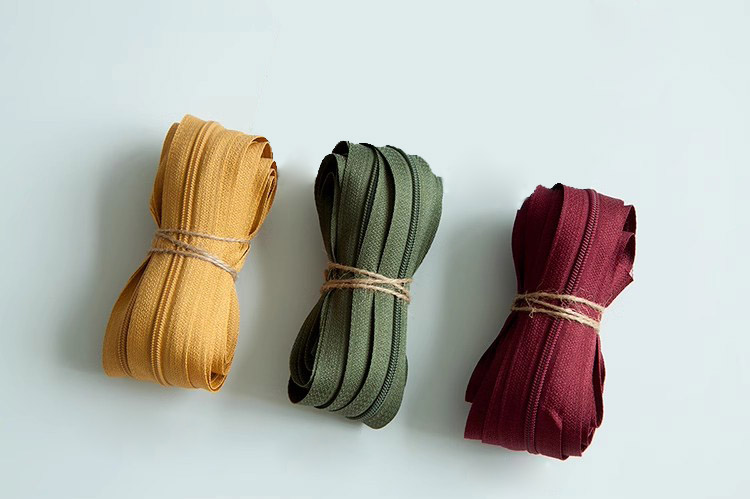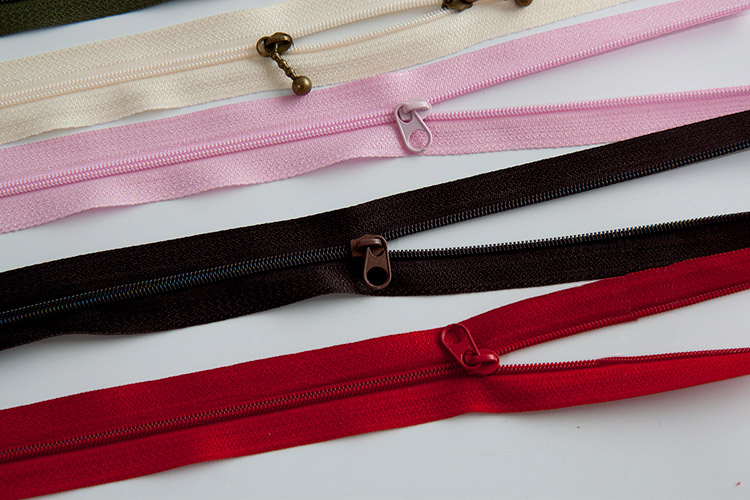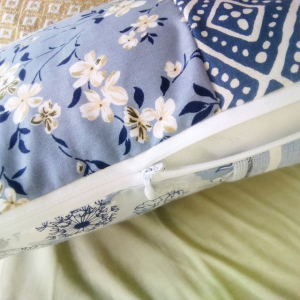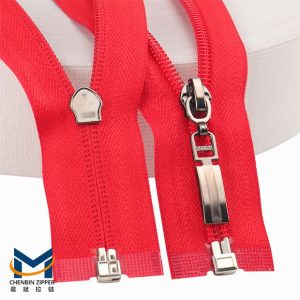Nylon Coil Zippers are already used in a wide range of apparel, accessories, outdoor products, and industrial products, they have become an integral part of our daily lives. In this article, we will explore the world of nylon coil zippers by examining their manufacturing process, various applications, benefits, and maintenance recommendations.
The Evolution of Zippers
Before we talk about the specifics of nylon coil zippers, let’s review the history first. In the late 1800s, the concept of the convenience zipper appeared into the world, but the invention in the 1940s dramatically changed the zipper industry. Until the 1960s, the nylon coil zipper was praised and widely adopted for its superior performance and versatility.
Understanding Nylon Coil Zippers
Nylon coil zippers are distinguished by their continuous spiral teeth crafted from polyester or nylon, and sewn onto a fabric tape to create a robust and flexible fastening mechanism. This coil design ensures seamless operation and high resistance to lateral stresses, catering to a spectrum of applications.
The Manufacturing Process
Producing nylon coil zippers involves several detailed steps to guarantee quality and functionality:
1. Tape Production
The process initiates with creating the zipper tape, the backbone of the zipper. High-grade polyester or nylon yarn is woven into a strong fabric tape using specialized looms, designed to endure regular use while providing a stable base for the coil teeth.
2. Coil Formation
The unique coil teeth are generated through a continuous extrusion process. Molten nylon or polyester is extruded through specially designed nozzles to form a spiral shape that cools and solidifies into the coil teeth. This step ensures precise consistency in tooth size and shape throughout the zipper.
3. Attaching the Coil to the Tape
Once formed, the coil teeth are sewn onto the fabric tape with high-speed machines, requiring precision to maintain secure attachment and proper alignment along the zipper’s length.
4. Slider and Top Stop Installation
The slider, which facilitates opening and closing, is added next, along with top stops to prevent it from detaching. Made from metal or plastic, these components must be installed carefully to guarantee smooth operation.
5. Bottom Stop Application
For closed-end zippers, a bottom stop is applied to prevent complete separation of the two sides. This is essential for maintaining the zipper’s integrity in its various uses.
6. Quality Control and Testing
Stringent quality control is practiced throughout manufacturing to certify that each zipper meets the required standards for strength, durability, and ease of operation.
Applications of Nylon Coil Zippers
Nylon coil zippers are exceptionally versatile, leading to their extensive use across a range of industries and products. Here are some common applications:
1. Apparel
These zippers are widely found in garments like jackets, dresses, pants, and skirts. They offer flexibility and smooth operation, making them ideal for clothing that demands secure closures without added bulk or weight.
2. Luggage and Bags
Nylon coil zippers are perfect for luggage, backpacks, and various bags due to their durability and strength. They stand up to the rigors of travel while allowing easy access to contents.
3. Outdoor Gear
Say tents, sleeping bags, and other outdoor equipment often utilize nylon coil zippers for their resistance to environmental elements and smooth operation, even in tough conditions.
4. Home Furnishings
In items like cushion covers and curtains, nylon coil zippers provide a discreet yet functional closure, suitable for many home furnishing applications.
5. Automotive Interiors
The automotive sector uses these zippers in seat covers, convertible tops, and storage compartments, benefiting from their durability and seamless function.
Advantages of Nylon Coil Zippers
The popularity of nylon coil zippers is driven by several advantages they offer:
1. Flexibility
Their coil design offers superior flexibility, making them suitable for curved applications and close-fitting garments.
2. Durability
Highly resistant to wear, nylon coil zippers maintain their performance even with frequent use.
3. Lightweight
These zippers combine strength with a lightweight structure, essential for applications where minimizing weight is a priority.
4. Smooth Operation
The continuous coil design ensures smooth functioning, reducing the risk of snagging or jamming.
5. Water Resistance
Many nylon coil zippers provide good water resistance, making them ideal for outdoor and marine uses.
6. Customization Options
Maintenance and Care
To ensure the longevity and optimal performance of nylon coil zippers, proper maintenance is crucial. Here are some tips for taking care of them:
1. Keep them clean: Regularly remove dirt and debris from the teeth using a soft brush or cloth.
2. Lubricate when necessary: If the zipper becomes stiff, apply a small amount of zipper lubricant or wax to the teeth.
3. Avoid forcing: If the zipper is stuck, gently work it back and forth instead of forcing it.
4. Store properly: When not in use, keep zippers in a cool, dry place to prevent moisture damage.
5. Handle with care: Avoid pulling on the surrounding fabric, as this can lead to misalignment or damage.
Innovations and Future Trends
The nylon coil zipper industry is dynamically evolving, with continuous research and development aimed at enhancing performance, sustainability, and functionality. Emerging trends include:
1. Eco-friendly materials: Manufacturers are exploring the use of recycled and biodegradable materials in zipper production.
2. Smart zippers: Integration of technology to incorporate added functionalities like built-in security features or temperature regulation.
3. Enhanced durability: Development of coatings and treatments to boost the lifespan and performance of nylon coil zippers.
4. Customization: Advances in manufacturing processes allow for greater customization, including unique shapes and designs.
Conclusion
Nylon coil zippers have transformed the fastener industry by offering an ideal mix of functionality, durability, and versatility. From their complex manufacturing process to their diverse applications, these zippers are integral across various industries. As technology advances and consumer demands evolve, we can anticipate further innovations in nylon coil zipper design and production, ensuring their continued importance in the future.
Frequently Asked Questions
1. Q: What is the difference between nylon coil zippers and metal zippers?
A: Nylon coil zippers consist of continuous spiral teeth sewn onto a fabric tape, providing flexibility and lightweight properties. Metal zippers have individual metal teeth attached to the tape, offering a more rigid and durable option for heavy-duty use.
2. Q: Can nylon coil zippers be used in waterproof applications?
A: While many nylon coil zippers offer good water resistance, they are not inherently waterproof. Specialized waterproof zippers or additional treatments may be necessary for fully waterproof applications.
3. Q: How do I choose the right size nylon coil zipper for my project?
A: Zipper size is typically determined by the width of the teeth. Common sizes include #3, #5, and #7, with larger numbers indicating wider teeth. Consider the intended use, fabric weight, and desired appearance when selecting the size.
4. Q: Are nylon coil zippers recyclable?
A: Although the nylon components can potentially be recycled, the mixed materials used in zipper construction (fabric tape, metal components) make recycling challenging. Some manufacturers are working on creating more recyclable options.
5. Q: How long do nylon coil zippers typically last?
A: With proper care and maintenance, nylon coil zippers can last for many years. Their lifespan depends on factors such as frequency of use, environmental exposure, and the quality of the zipper itself.













